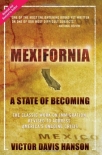Mexifornia: A State of Becoming, Victor Hanson [cool books to read .txt] 📗

- Author: Victor Hanson
Book online «Mexifornia: A State of Becoming, Victor Hanson [cool books to read .txt] 📗». Author Victor Hanson
Others only haphazardly take medication for tuberculosis, a disease that is thirteen times more likely to be found in Hispanics than in whites. Not long ago, Hernando, who used to come by to borrow money, peddle illegal fireworks and look for scrap iron, said his "little" cough was now "three years old," and swore the medicine was worse than the disease - and thus to be avoided at all costs. I apologized for not wanting to talk closely with him and holding my breath as he went on and on. Nineteenth-century ailments that are rare among citizens of rural California - adult whooping cough, hepatitis, even tetanus - are not so rare among illegal immigrants, who enter without the health checks normally demanded of immigrants a century ago. Thousands of young men id women are leaving some of the most treacherous and disease-ridden terrain on the planet to go north. A man's immune system does not shed viruses when he crosses the border. It takes some time - and a lot of tax dollars - for a worker plagued with intestinal parasites, occasional malaria and drug-resistant TB to reach a level of Americanized health where his greatest worry will be acne and allergies.
Subsidiary industries of illegality also tempt the workers - mostly the fencing of stolen property (lawn mowers, scooters, bikes, hand tools and such) at rural swap meets. When cash, not credit card and checks, is the common currency, and there is no confirmation of citizenship, then one buys almost everything on the spot and without proof of sale. And when an illegal alien makes less than $30,000 a year, he is more likely to discount the moral implications of buying goods that are clearly stolen from others. Receipts are not needed or wanted; possession, not title, is the rule of ownership. When I lose a valuable piece of yard or farm equipment I often venture two miles down the road to the Selma Swap Meet on Sundays to see whether I can buy it back at ten cents on the dollar. Shovels, yard tools, electrical tools - anything not tied down or locked up - have all vanished from my farm. Their simulacra are on sale in an open-air mart a few miles away at a fraction of the replacement expense.
Two rural households just a mile away from mine routinely arrange cheap, second-hand bicycles, motor scooters and power tools on their lawns for cash sale - no proof of purchase, no receipts, no questions asked. Just today I shooed away Raul Ochoa, who went to high school with my son, when he showed up with an entire set of hydraulic chain saws, clippers and other accessories - brand new, obviously stolen. Careless as to how to use them, he offered them all to me for $20, about 2 percent of their real worth. But then Raul was just released from jail for his second felony grand theft conviction, and had plenty of things in a prior cache to move before risking a life behind bars to steal more and replenish his stocks. The other vatos in his car, I noticed, seemed to be eying my car, truck, lawn mower - and me as well.
In spring 2003, during the editing of the present book, all the mailboxes on our rural road were vandalized; our shed twenty yards from the house was broken into and ransacked a few hours after four Mexican youths stopped to inquire about "buying gas"; and twenty-four hours later our garage had all the spare furniture looted in the middle of the night. Roberto, who lives half a mile away, said he spotted three young Mexicans rifling through his mailbox, but could not catch them on his tractor as they sped away with all his just-paid bills. I reminded him that putting his mail in his own mailbox in rural Selma was like writing a blank check to a gang-banger.
Worse are the meth labs that seem to spring up throughout rural California - the nation's drug capital for do-it-yourself chemists. Workers in these operations can make thousands of dollars in a summer. Such potential profits explain why the drug is ubiquitous on our streets and why aliens who use and sell it are cramming our prisons. Unlike the heroin or cocaine trade, meth is particularly attractive to the rural immigrant. It is usually concocted among familiar trees and vines, in a rented barn or shed miles from town, where the immigration authorities and sheriffs rarely intrude. It is a natural outdoor activity ancillary to farm work, likewise conducted in solitude and with the same network of smugglers and contractors known from the illegal trek into the United States. On two occasions, tough-looking men have shown up in my yard inquiring about renting my barn as a future "dormitory" for workers - code for a drug-making lab. If a man is here illegally and living in a stealthy world to begin with, having come from a culture where drug dealing and manufacturing are endemic among the bureaucrats and the police, then the occasional straying from the vineyard to the lab need not be so radically defined in Manichean terms of good versus evil. One year of drug chemistry might earn an illegal alien $40,000 in cash, and give him the much-sought-after victorious return to Mexico in a way farm wages never can; or, contrarily, it can earn him twenty years in Folsom Prison, a body illustrated with tattoos, and lifelong membership in a Mexican prison gang.
Despite the dangers and drudgery, however, the wage for menial labor in America is far better than anything earned in Mexico. An unskilled laborer from the Sierra Madre is lucky to make





Comments (0)